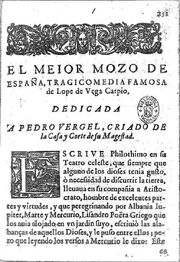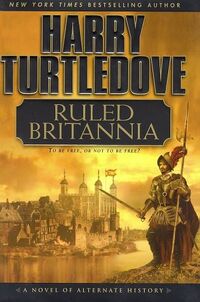TR (Message Wall | contribs) m (El Mejor Mozo de Espana moved to El Mejor Mozo de España) |
ML4E (Message Wall | contribs) mNo edit summary |
||
| (15 intermediate revisions by 6 users not shown) | |||
| Line 1: | Line 1: | ||
| + | [[File:EMMDE Cover.jpg|thumb|]] |
||
| ⚫ | '''''El Mejor Mozo de España''''' |
||
| + | '''''El Mejor Mozo de España''''' ("The Best Boy in [[Spain]]") is a 1625 Spanish historical play written by playwright [[Lope de Vega]]. The plot revolves around the future Queen [[Isabella I of Castile]]'s decision to become heir to her half-brother King Henry IV and her pursue of an ideal husband, choosing in the end the future King [[Ferdinand II of Aragon]]. |
||
| + | A play with the same title was written by Alfonso Paso in 1962, this time based on de Vega's own life. |
||
| ⚫ | |||
| − | + | == ''El Mejor Mozo de España ''in ''[[Ruled Britannia]]'' == |
|
| ⚫ | '''''El Mejor Mozo de España''''' was a play written by [[Spain (Ruled Britannia)|Spanish]] First Lieutenant and theatre aficionado [[Lope de Vega (Ruled Britannia)|Lope de Vega]] in 1598, honoring the 15th-century Spanish King [[Ferdinand II (Ruled Britannia)|Ferdinand of Aragon]] and his queen, [[Isabella I (Ruled Britannia)|Isabella of Castile]], for whom [[Philip II (Ruled Britannia)|King Philip II's]] daughter [[Queen Isabella]] of [[England (Ruled Britannia)|England]] was named. |
||
| + | |||
| ⚫ | The play debuted in [[London (Ruled Britannia)|London]], where de Vega was stationed and was first performed there before an audience that included Queen Isabella and her husband, [[King Albert]]. Isabella was played by de Vega's mistress, [[Catalina Ibanez]]. It was written in the Spanish style, that is with three acts as opposed to the English five. |
||
| + | |||
| + | === Literary comment === |
||
| + | Despite having been written nearly [[Inconsistencies in Turtledove's Work#Inconsistencies in Ruled Britannia|three decades before it existed]] in [[OTL]], the play in the novel follows the historical one in every stated particular. |
||
| + | |||
| + | {{Ruled Britannia}} |
||
| + | {{DEFAULTSORT:Mejor mozo}} |
||
| + | [[Category:Plays|Mejor Mozo de España]] |
||
[[Category:Ruled Britannia|Mejor Mozo de España]] |
[[Category:Ruled Britannia|Mejor Mozo de España]] |
||
| + | [[Category:Inconsistencies]] |
||
Revision as of 23:26, 8 October 2019

El Mejor Mozo de España ("The Best Boy in Spain") is a 1625 Spanish historical play written by playwright Lope de Vega. The plot revolves around the future Queen Isabella I of Castile's decision to become heir to her half-brother King Henry IV and her pursue of an ideal husband, choosing in the end the future King Ferdinand II of Aragon.
A play with the same title was written by Alfonso Paso in 1962, this time based on de Vega's own life.
El Mejor Mozo de España in Ruled Britannia
El Mejor Mozo de España was a play written by Spanish First Lieutenant and theatre aficionado Lope de Vega in 1598, honoring the 15th-century Spanish King Ferdinand of Aragon and his queen, Isabella of Castile, for whom King Philip II's daughter Queen Isabella of England was named.
The play debuted in London, where de Vega was stationed and was first performed there before an audience that included Queen Isabella and her husband, King Albert. Isabella was played by de Vega's mistress, Catalina Ibanez. It was written in the Spanish style, that is with three acts as opposed to the English five.
Literary comment
Despite having been written nearly three decades before it existed in OTL, the play in the novel follows the historical one in every stated particular.
| |||||||||||||||||||
